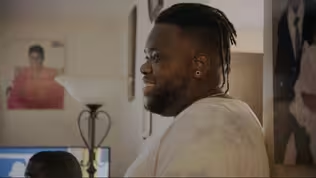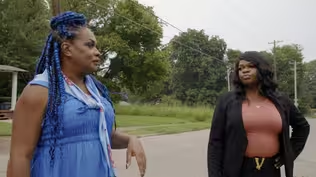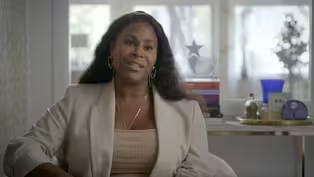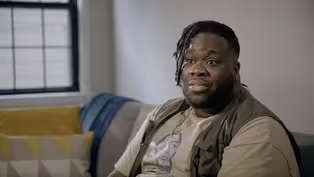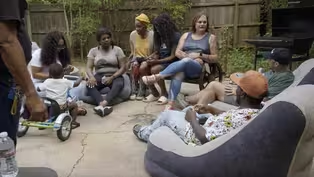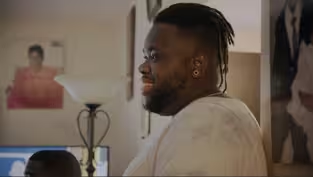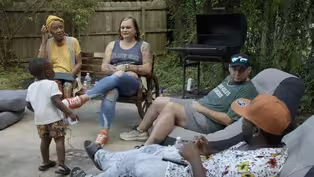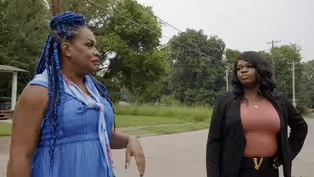
American Problems, Trans Solutions
Season 8 Episode 11 | 25m 17sVideo has Closed Captions
Stories of trans leaders addressing critical issues around economic empowerment and human dignity.
In the U.S., Black trans people are among the most marginalized of marginalized Americans. Award-winning journalist Imara Jones shares the stories of trans leaders Kayla Gore, Breonna McCree, and Oluchi Omeoga who, despite the record-breaking number of anti-trans bills passed in 2023, are addressing critical issues surrounding economic empowerment and human dignity with heart and vision.
Problems playing video? | Closed Captioning Feedback
Problems playing video? | Closed Captioning Feedback
Funding provided by the Corporation for Public Broadcasting, John D. and Catherine T. MacArthur Foundation and Wyncote Foundation.

American Problems, Trans Solutions
Season 8 Episode 11 | 25m 17sVideo has Closed Captions
In the U.S., Black trans people are among the most marginalized of marginalized Americans. Award-winning journalist Imara Jones shares the stories of trans leaders Kayla Gore, Breonna McCree, and Oluchi Omeoga who, despite the record-breaking number of anti-trans bills passed in 2023, are addressing critical issues surrounding economic empowerment and human dignity with heart and vision.
Problems playing video? | Closed Captioning Feedback
How to Watch Local, USA
Local, USA is available to stream on pbs.org and the free PBS App, available on iPhone, Apple TV, Android TV, Android smartphones, Amazon Fire TV, Amazon Fire Tablet, Roku, Samsung Smart TV, and Vizio.
Providing Support for PBS.org
Learn Moreabout PBS online sponsorshipWOMAN: Reverse shot, take one.
Mark.
IMARA JONES: I've often said, when I got asked what I thought, as a journalist, was one of the most underreported stories of our time.
And I said the leaders from communities across the country who are Black and trans, who are trying to figure out how to do things in a new way.
And I kept imagining that when I got asked that in a group of journalists, that someone would actually do the story, and no one did.
And so finally, I was, like, "Okay, we're just going to tell this story."
And that's what led me to Kayla, to Breonna, and to Oluchi.
♪ ♪ OLUCHI OMEOGA: When I look back on my life, I really want to say, "We shifted how people see Black trans people."
- Say cheese.
♪ ♪ KAYLA GORE: People are excited that people are developing here in South Memphis.
- This is the Tenderloin, and so this also is the Trans District.
JONES: I think the most important reason to support Black trans leaders is because our traditional wells of leadership aren't leading us to the change that we need.
♪ ♪ ♪ ♪ Welcome-- I'm journalist Imara Jones.
Right now, as America grapples with a multitude of challenges, I decided to go out and find individuals who are at the forefront of making positive change, specifically singling out three Black trans activists and social entrepreneurs who are working towards a better and more equitable world.
These three are rising to the occasion to address some of the nation's most pressing issues, from housing disparities and economic inequality to immigration.
Through their work, these leaders are pushing boundaries and coming up with groundbreaking solutions.
So, we invite you on this journey to explore their remarkable stories, where we reveal how they've harnessed their resilience and determination to tackle some of our toughest problems.
♪ ♪ First, we'll meet Kayla Gore, a powerful innovator for housing equality.
Kayla's organization, My Sistah's House, paves a way to homeownership for the trans community in her hometown of Memphis, Tennessee.
♪ ♪ ♪ ♪ (birds chirping) Home, for me, it means safety, security, it means stability, it means comfort.
(laughing) GORE: Growing up, that wasn't even a question of, I would have a place to, like, lay my head.
Becoming an adult, I started to face realities of people not liking how I present in the world, and that prevented me from having housing.
I ended up being homeless for about maybe six or seven months.
A lot of people who are homeless, they're more vulnerable to, you know, people robbing them in their sleep or even something even more violent.
And I think that played a big role in starting My Sistah's House.
♪ ♪ JONES: So, every place that I've seen where you all build or are planning to build, you put these signs up.
GORE: Yes.
- Why do you put the signs up?
- It's just, you know, to show a little pride in the neighborhood.
We don't put them in the houses that are occupied.
- Okay.
- Unless they request it.
- Because you don't want people to be targeted.
- Yeah.
- But while you're building or when you bought the lot, you do.
- Right.
- In order to create visibility and normality.
- Oh, yeah.
♪ ♪ GORE: We're doing this through a mutual aid project, which gives us the opportunity to be very flexible about the homeownership portion of it, where people can actually purchase these homes without having to do down payments.
We're not doing a credit check on people.
It really helps people who would never, ever, in their wildest dreams, think that they would ever own a home.
♪ ♪ (toys rolling) TAVIANNA: Our first place was in West Memphis, and, um, I think from there, we stayed there a year.
- Mm-hmm.
- Had some complications with the apartment, and then without notice, our rent was going up.
We talked to Kayla, and we was moved in, like, three weeks later.
♪ ♪ GORE: Initially, when we started at the house on Prescott, it wasn't really a conversation.
It was just, like...
I remember one day, she came over, and she was, like "Who are these people?"
I think I was getting the mail or something, and I was, like, "Hey, how you doing?
What's your name?"
Then I called her on the phone.
What did I say?
- You said those were the people that lived there and you were helping them.
And I was, like, "Well, okay."
GORE: It kind of started with just word of mouth, like, "Hey, go see Kayla about the Underground Railroad to the houses," you know.
(chuckles) MALACHI: I think as soon as I walked in, I was, like, "Okay, the couch is going right here, "this is going there, then we're going to put this over there."
I was automatically, like, "This is how we gonna set this up."
I already had it figured out before we came in here.
JONES: What have you seen people do when they get the keys to the house and they walk in?
GORE: It's different reactions.
- Okay.
- From different people, and I think it's really derived from what experience they're coming from.
- Mm-hmm.
- Some people have come from living in their cars, and they're already private people with things they experienced.
So, you know, we have to work with people, kind of, like, peel back the layers a lot with some folks, but then you have some people who are coming from familiar places, like their parents' home or a friend's home, where they just couldn't keep staying there because it wasn't truly theirs, if that makes sense.
- Mm-hmm.
- They could be asked to leave at any time.
- Mm-hmm.
- It could be... Just, like, a difficult, uncomfortable situation.
So it really depends on the person.
- What does the neighborhood think of places like this, that are modern and look different?
- I'll say that the people are excited that people are developing here in South Memphis, and Glenview, particularly.
- Mm-hmm.
- The neighbors love the houses.
They're always, like, "How much them renting for?"
And, you know, they always want to move in.
- Right, right.
- You know, and it's the same.
- Everybody want to move in.
- Everybody wants to move in.
♪ ♪ GORE: Can we get y'all in front of the house?
MALACHI: You might have to pick him up, yeah.
GORE: In front of the house?
- Yeah.
Say cheese.
TAVIANNA: He's kissing it.
- Say cheese.
Say cheese.
- He's kissing his rock.
- Okay, it's cool.
- We were able to, like, have a part in our home.
Like, we were able to make the backyard, like, ours, you know, with the help of community.
And, like, now we have a beautiful home.
JONES: What's your dream for My Sistah's House, when you step back and see the biggest possible vision for what you're doing?
It's gonna always be the same.
It's just that we don't have to exist anymore.
Like, that we don't have to do this work anymore, that, that the playing field has been level for people, that we don't have to advocate on behalf of a specific group of folks.
I don't want our history, I don't want our legacy to be that we came and we're still here.
It's very much so possible for everybody to have a house.
♪ ♪ My vision is for a world where everybody thrives, and I think that that first starts with us hearing from everyone and incorporating their ideas into how we think about the world around us, to create a society that's better for everyone.
♪ ♪ Next, we're going to go to the Transgender District in San Francisco to meet Breonna McCree.
Breonna is dedicated to advancing economic opportunity through a small business incubator for trans people, and it's redefining entrepreneurship in America.
♪ ♪ So is this technically the Tenderloin?
This part?
- This is the Tenderloin, and so this also is the Trans District.
- Mm-hmm.
- It's two blocks down Sixth Street... - Mm-hmm.
- ...and this area up here, I think four to eight blocks.
- Mm-hmm, mm-hmm.
There seem to be some new buildings, like, there's a new hotel-- that, and I was, like, is there a gentrification creeping into this area?
- Gentrification is always creeping in San Francisco.
- (laughs) - But we are trying to get city officials also to give our folks some of that money.
- Right, right.
- Through grants, so they can own storefronts, also.
Why not help the Trans District support folks in that effort?
- That's right.
♪ ♪ SAM FAVELA: Are we all excited for tonight?
Yes.
6:00 is when the program's starting.
And then we introduce Breonna and Carlo as our new E.Ds., and then we play a movie.
So, one movie is them describing how the Transgender District helped them out as a, a small business entrepreneur.
And the other one is them describing their business and who they are.
The Transgender District is an arts and culture district founded by three Black trans women in 2017.
The Transgender District works to provide economic empowerment for trans and non-binary communities, especially through our Entrepreneurship Accelerator program.
This is a program that is the possibility model for workforce development and owning your own.
Systems that trans folks were locked out of since Creation.
The Trans District has made this possible, for trans folks to create, be the visionaries, and own their own businesses.
♪ ♪ ♪ ♪ Happy Transgender History Month!
(guests cheering and applauding) Here tonight, at the graduation, celebrating our entrepreneurs... CARLO GOMEZ ARTEAGA: We wanted to really recognize the efforts that each one of these individuals took to not just birth this idea, but to see it through.
(laughing) MCCREE: Folks were always told... Like, I was told as a kid that this is not even on the table for you, and I believed it.
I think I walked through the next 30 years of my life believing that.
And it wasn't until Doris, this woman that I met, she comes in with this cream jumpsuit, looking so elegant.
Fast-forward, we see her on the track.
♪ ♪ So the track is where folks go and do sex work.
And so we are talking, and she's talking about how she works during the day, and she is doing sex work to just earn money on the side.
And so I never knew that trans people had jobs.
And so then we just went back to hopping in and out of cars.
But there was one night... She said, "When you get tired of being used as a receptacle, you should come and see me."
MIKAELA-GISELLE BROOKS: I am very thankful for the Transgender District and this opportunity, because before I even got here, like, I was going through my transition myself, like, I don't really have trans friends.
I was just really going through all of this on my own.
And with you all, honestly, you know, you're going through the same thing with me.
And I'm just so appreciative, and it is a godsend.
So thank you all so much, thank you.
(guests applaud) When I think about Doris, it brings me this joy that someone saw that I could be something more.
(voice breaking): It brings this spirit of grounding me in the work... (voice trembling): ...and... ...shaking off all of the doubt and all of the insecurity... ...because someone believed in me.
(talking in background) MCCREE: And just having someone to say, "Oh, this is possible."
And not only now is it possible, but, "I can give you the tools to lead you, if this is the path you want to take."
(talking in background) We have to look to people who can imagine things anew, because they are the most disaffected by the way that things are working.
And so I think that we have to begin to incorporate the vision of trans people if we're going to solve some of our toughest problems.
♪ ♪ Our last stop is with Oluchi Omeoga, who is based in Minneapolis, Minnesota.
As the co-director of the Black LGBTQIA-plus Migrant Project, Oluchi works with underrepresented Black trans migrants who are at the intersection of immigration, race, and gender identity.
His work pushes our ideas about who matters and why.
♪ ♪ OMEOGA: When I look back on my life, I really want to say we shifted how people see Black trans people, how people see migrant folks.
♪ ♪ Igbo people are folks from Nigeria, and both of my parents are from that area.
In the '60s, there was a civil war called the Biafra War.
It really crippled, specifically, the Igbo economy a lot.
Folks were unable to find jobs and flourish and actually thrive.
And so they came for a better opportunity to get an education.
Um, and I think the goal was always to bring that back from the United States to Nigeria.
I think what was so beautiful in my upbringing is that the value of community was something that was inundated in me from a very young age, like, understanding what communities that I was a part of, and what did that look like.
So they were one of the most important pieces to me around how I have shaped my values around, and my practice around, actually creating communities.
I think, for a very long time, I quieted a lot of my identities to appease.
Literally not show them, right?
Not be loud, not be vibrant, not talking about immigration stories.
But then, even at home, quieting my identities, as far as, like, my gender and sexuality.
After I left my parents' house, just because of necessity, um, the Purple Palace was actually the spot that I called home for a period of time.
And I got to live in a shoebox with, like, eight other queer folks.
Um, and they were also the same people that I was able to organize with in the streets, too.
So, um, to really build intentional community and my passion for creating spaces for those who are most marginalized really came from this house.
♪ ♪ In 2016, I was invited to this queer Black migrant gathering.
We were talking about, uh, where are the spaces for us, and how are those organizations not taking care of our unique identity?
Out of that gathering that came together and was, like, "We actually have to build something for our people, "for Black, queer, and trans migrants and first-generation folks."
And that was the actual co-founding body of the Black LGBTQ Migrant Project, or BLMP.
♪ ♪ The immigration journey is hard and complicated.
There are people that we know that are migrating out of, like, Honduras or Guatemala, or even some from continental Africa, that are, like, "Hey, I'm trying to seek asylum because of my LGBTQ identity."
♪ ♪ We have lawyers that are able to navigate them through the legal process, service providers.
Um, we also partner with shelters that, um, they'll be with other LGBTQ people so that they feel as safe as they can.
And then the last piece is the organizing, right?
It's not just providing a service, but it's also questioning and fighting for why that service has to exist in the first place.
The reason why BLMP is so important to me is that it was the first space that I created, or that was created, that I felt whole.
But also, all of our members have shared that same sentiment around the first space in which they haven't had to quiet down a piece of their identities.
And I think the important part, too, on both a personal and a collective level, is that we're able to repair and heal our relationships to our cultures.
Um, for a very long time, have not been able to identify with my cultural identity.
And for the first time, I'm in a space in which folks are also doing that healing work at the same time, healing for our cultures and for identities.
So, this is really, like, pretty much immigrant central.
- Like all types of immigrant communities are here.
- All types of immigrant communities, yeah.
- And so during George Floyd, um, during the uprising, was this a neighborhood that was also very much activated by that?
- Yeah, so if we actually go back just, um, south a couple of blocks, that's actually where 38th and Chicago is.
Um, so with the uprisings, this area was also very vibrant as it pertains to the organizing that was happening.
- Well, it's really fascinating for me, because a lot of times, like, immigrants' communities are highly segregated.
- Yeah.
- But the fact that you have, like, this community, and then as well, like, you know, a Somali restaurant and other types in one place, it really speaks to something different.
- Yeah.
This community is pretty much a melting pot of a lot of different migrant identities.
JONES: So we're here in an immigrant neighborhood in front of a mural of, um, a butterfly, which is also a part of the work of, um, BLMP.
- Yeah.
- And I'm wondering for you all, why did you choose the symbolism of a butterfly?
- Yeah, so the butterfly, really, for, for both communities is really important, um, specifically around migration for migrants and for trans people, you know, about metamorphosis and, um, not prescribing to the gender identity that we were prescribed at birth, um, and really morphing into our actual identities.
- One of your also essential points, which is changing the way that people think about migrants, that change in mindset is also about metamorphosis.
- Exactly.
- There has to be a metamorphosis in the way that people see people who are migrants... - Yeah.
- ...and LGBTQ.
- Exactly.
♪ ♪ OMEOGA: Queer Black people, queer trans people, queer Black migrants, whatever, we have such a specific intersection and understand systems of oppression on multiple layers, that we are actually the only ones that can formulate a solution.
And we're the ones that have to lead in those situations, um, because we know the solutions to our issues.
♪ ♪ The problems are endemically American.
They are issues that have been going on for decades.
♪ ♪ Economic opportunity, how we house everybody, who belongs here.
I mean, those are the most fundamental questions that the country has been dealing with.
And in many ways, those issues have just gotten worse.
They've just been exacerbated over the past 20 years.
And so those are the problems that we face, and they are intergenerational.
Those are legacy issues in the United States.
But trans solutions, right, reimagining something that is new and that hasn't been tried, I think is inherently endemic to trans people.
I think that the font of creativity that trans people have to have in order to, first, be able to see themselves, and then, secondly, to bring that vision into the world, instantly makes you capable of seeing new combinations or seeing new possibilities that no one else sees.
The fascinating thing is that there's so many more stories to tell.
And we need to find ways to embrace and lift them up and bring them forward.
Because by listening to traditional people and traditional voices in traditional places, it's not getting us anywhere.
So that means that we have to begin to transform who gets heard.
♪ ♪ ♪ ♪ ♪ ♪ ♪ ♪ ♪ ♪
American Problems, Trans Solutions | Believing in You
Video has Closed Captions
Clip: S8 Ep11 | 55s | "If you can see it, you can be it." Breonna McCree talks about the one person who believed in her. (55s)
American Problems, Trans Solutions | Black LGBTQIA+ Migrant Project
Video has Closed Captions
Clip: S8 Ep11 | 25s | How did the Black LGBTQIA+ Migrant Project get its start? (25s)
American Problems, Trans Solutions | My Sistah's House
Video has Closed Captions
Clip: S8 Ep11 | 35s | Kayla Gore shares her dream for My Sistah's House and unhoused transgender people of Memphis. (35s)
American Problems, Trans Solutions | Preview
Video has Closed Captions
Preview: S8 Ep11 | 30s | Stories of trans leaders addressing critical issues around economic empowerment and human dignity. (30s)
American Problems, Trans Solutions | The Meaning of Home
Video has Closed Captions
Clip: S8 Ep11 | 47s | What does home mean to you? Kayla Gore talks about My Sistah's House and hopes for its legacy. (47s)
American Problems, Trans Solutions | Trailer
Video has Closed Captions
Preview: S8 Ep11 | 1m 10s | Stories of trans leaders addressing critical issues around economic empowerment and human dignity. (1m 10s)
Providing Support for PBS.org
Learn Moreabout PBS online sponsorshipSupport for PBS provided by:
Funding provided by the Corporation for Public Broadcasting, John D. and Catherine T. MacArthur Foundation and Wyncote Foundation.
